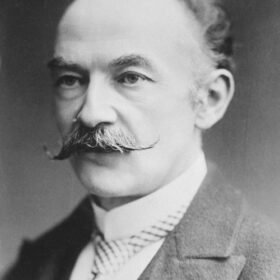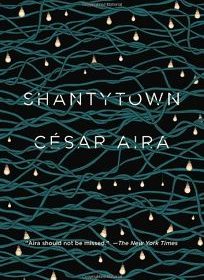-

Adios, Paul Auster
I came Paul Auster not through The New York Trilogy but through a skinny chapbook from Station Hill press called Facing the Music, published in 1980. It had goodbye woven all through it. Not “goodbye cruel world” but goodbye to poetry, which he’d been writing and publishing for a decade. It was his last standalone collection, and when I think of him now, I think of those 13 pages of valedictory verse. Poetry may address emptiness but it thrives in being. Auster needed prose to keep one foot firmly planted in each of those conditions.Read More
-

Imagine My Surprise…
I have a lovely but inexpensive set of novels by Thomas Hardy, whose poetry I’m familiar with but whose prose I’ve put off reading. I can’t say why I’ve put off that pleasure, but I’m in the process of correcting it now. The writing is rich, interweaving description and action and moving from heights to depths and back, at times in the same paragraph. But fifteen chapters in, I was unprepared for an idea whose origin I thought I knew: the idea that we all pass the anniversary of our death every year without knowing it.Read More
-

Immensity’s Resonance
I’ve never, as I recall, posted while vacationing in México. It is typically an escape into extended quiet time with my lovely wife amid sea vistas, the soft rattle of palm leaves, a margarita or two, conversations with good friends in which I slaughter the Spanish language … and, of course, a stack of books to read. José Juan Tablada This time I’m also diverting myself by translating a small book of haiku-influenced poems by José Juan Tablada, called Un Día … poemas sintéticos (One Day … Synthetic Poems).Read More
-

Adventures in Reading 2018
Old Reading Room at BookBar (Photo: Tricia M.) Let me admit up front that I’ve included half a dozen books here that were read as part of my work with the Professional Creative Writing program at University College. But they all turned out to be worthwhile reading experiences. Even those I couldn’t quite connect with—Juan Gelman’s The Poems of Sidney West, Ben Lerner’s Angle of Yaw, and Adonis’s powerful Concerto al-Quds, which is also recondite and nakedly anguished by turns—continue to haunt me. This is usually an early indicator of re-readings in the offing.Read More
-

Tom Gauld on Coping with Computers
See the full cartoon here.Read More
-

The Statistical Minority
Josef Škvorecký, the great Czech novelist, author of The Engineer of Human Souls (beautifully translated by Paul Wilson) and other meditations on in the spiritual/intellectual havoc inflicted by totalitarians, writes this about the the rise and fall of the Prague Spring: The statistical majority struggles only for more bread; the statistical minority struggles too, for more non-bread.Read More
-

Reality and the Kingdom of Images
How strange to discover the figure of Donald Trump in a 2001 novel by César Aira! I’m speaking of Shantytown, in which Aira presents a character called Judge Plaza, an obese woman with dyed-blond hair. Here’s how Aira describes her (pp. 128-129), in Chris Andrews‘ fine translation: Very confident, well-groomed, commanding and decisive. She had earned her reputation. She inspired fear. The tabloid journalists loved her, and so did their huge audience, who felt it was time for a tough and energetic justice, unhampered by wigs and precedents, ready to take to the streets and fight crime on its own turf.Read More


 Joseph Hutchison, Colorado Poet Laureate 2014-2019, has published 20 collections of poems and edited or co-edited three poetry anthologies. He currently directs two master’s-level programs for University College at the University of Denver: Professional Creative Writing and Arts & Culture Management. Joe lives with his wife, Melody Madonna, in the mountains southwest of Denver, Colorado, the city where he was born.
Joseph Hutchison, Colorado Poet Laureate 2014-2019, has published 20 collections of poems and edited or co-edited three poetry anthologies. He currently directs two master’s-level programs for University College at the University of Denver: Professional Creative Writing and Arts & Culture Management. Joe lives with his wife, Melody Madonna, in the mountains southwest of Denver, Colorado, the city where he was born. 









